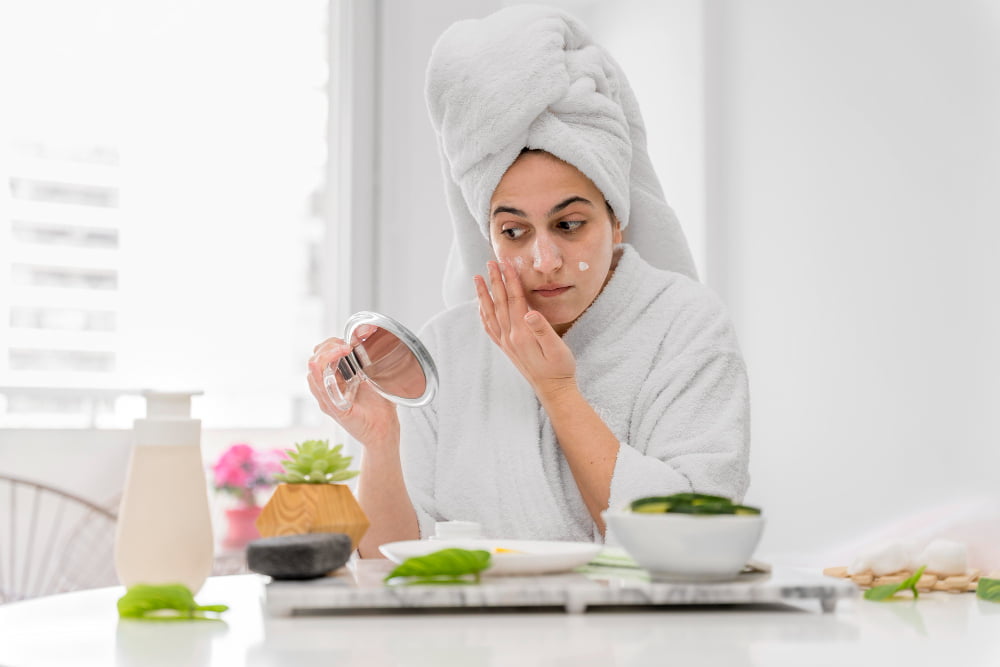Achieving a youthful glow and reversing the signs of aging doesn’t have to be a complex mystery. With the right knowledge and tools, you can create a skincare regimen that not only meets your unique needs but also promotes lasting radiance and vitality. This article will explore five essential skincare tips that are grounded in understanding your skin type, the importance of hydration, the necessity of sun protection, the benefits of antioxidants, and the impact of nutrition on skin health. By incorporating these tips into your daily routine, you can turn back time and reveal a more youthful, glowing complexion.
Key Takeaways
- Identify and cater to your specific skin type for a more effective skincare routine.
- Maintain skin hydration both topically with the right moisturizers and internally through adequate water intake.
- Incorporate sun protection into your daily regimen to prevent premature aging and protect against harmful UV rays.
- Utilize antioxidants in your skincare products to combat free radicals and promote skin repair and rejuvenation.
- Adopt a nutrient-rich diet with foods that enhance skin vitality and ensure an intake of essential vitamins and minerals for a radiant complexion.
Understanding Your Skin Type
Identifying Your Skin’s Needs
To achieve a youthful glow, it’s crucial to understand that skincare is not a one-size-fits-all solution. The first step is to identify your skin type; this will guide you in selecting products that will be most effective for your unique complexion. Generally, skin types are categorized as normal, dry, oily, combination, or sensitive.
Listen to your skin. It often sends signals that can help you determine its needs. For instance, tightness after cleansing may indicate dryness, while excessive shine could suggest an oily complexion. Here’s a simple way to start:
- Wash your face and pat it dry.
- Wait for about an hour and then observe how your skin feels.
- Check for any shine on your forehead, nose, and chin.
- Notice if your skin feels tight, especially when you make facial expressions.
Tip: Always consider how your skin reacts to changes in the environment or to new products. This will help you adapt your skincare routine to better suit its needs over time.
Customizing Your Skincare Routine
Once you understand your skin type, customizing your skincare routine becomes a game-changer. Tailoring your regimen allows you to address your unique concerns effectively. Start by selecting products that complement your skin’s characteristics. For example, those with oily skin might opt for lightweight, oil-free moisturizers, while dry skin types may require richer, more emollient creams.
- Consider the following steps to customize your routine:
- Assess your skin’s condition regularly, as it can change with seasons, age, and lifestyle.
- Introduce one new product at a time to monitor how your skin reacts.
- Pay attention to how your skin feels after application—tightness, discomfort, or oiliness can indicate product incompatibility.
Tip: Always patch test new products to minimize the risk of adverse reactions. This simple step can save your skin from irritation and long-term damage.
Remember, the goal is to nurture your skin, not overwhelm it. A minimalistic approach often yields better results than an extensive routine overloaded with active ingredients. Listen to your skin—it’s the best guide to achieving a youthful glow.
The Power of Hydration

Choosing the Right Moisturizers
Selecting the right moisturizer is crucial for maintaining a youthful glow. Moisturizers help to lock in hydration and protect the skin barrier. When choosing a moisturizer, consider your skin type and the specific concerns you wish to address.
For oily skin, look for lightweight, non-comedogenic formulas that hydrate without clogging pores. Dry skin types will benefit from richer, emollient creams that provide intense moisture. Sensitive skin requires gentle, fragrance-free options to minimize irritation.
- Normal Skin: Light lotions or gels
- Dry Skin: Creams and ointments
- Oily Skin: Oil-free moisturizers
- Combination Skin: Balancing lotions
- Sensitive Skin: Hypoallergenic and fragrance-free
Tip: Always apply moisturizer to damp skin to enhance absorption and effectiveness. Remember, the right moisturizer can make a significant difference in your skin’s health and appearance, so take the time to find one that works best for you.
Hydration From the Inside Out
Achieving optimal hydration isn’t solely about what you apply on your skin; it’s equally about what you consume. Drinking enough water is the cornerstone of internal hydration, but there are other ways to boost your skin’s moisture levels from within.
- Water intake: Aim for at least 8 glasses a day.
- Herbal teas: These can be hydrating and offer additional antioxidants.
- Water-rich foods: Incorporate fruits and vegetables like cucumbers, oranges, and watermelon into your diet.
Tip: Remember that caffeinated beverages can dehydrate you, so balance your intake with plenty of water and herbal teas.
While external moisturizers are crucial, they work best when complemented by a hydrated body. Consider your diet as part of your skincare routine and choose foods that support skin health. This holistic approach can help maintain your skin’s elasticity and youthful glow.
Sun Protection as a Daily Ritual

Selecting the Best Sunscreen
When it comes to protecting your skin from the sun’s harmful rays, selecting the best sunscreen is crucial. Look for products that offer broad-spectrum protection to shield against both UVA and UVB rays. An SPF of 30 or higher is recommended for daily use, even on cloudy days or when indoors near windows.
Water resistance is another key factor, especially if you’re active or will be swimming. While no sunscreen is completely waterproof, those labeled as water-resistant can provide protection for either 40 or 80 minutes while swimming or sweating.
Tip: Apply sunscreen generously 15 minutes before sun exposure and reapply at least every 2 hours, or immediately after swimming or sweating.
Consider your skin type and any skin conditions when choosing a sunscreen. For sensitive skin, mineral sunscreens containing zinc oxide or titanium dioxide are often less irritating. For acne-prone skin, look for non-comedogenic formulas that won’t clog pores.
Here’s a quick checklist to help you select the right sunscreen:
- Broad-spectrum protection
- SPF 30 or higher
- Water resistance
- Suitable for your skin type
- Non-comedogenic if you have acne-prone skin
Combating Photoaging
Photoaging, the premature aging of the skin due to repeated exposure to ultraviolet radiation, is a significant concern for those seeking to maintain a youthful glow. While sunscreen is your first line of defense, there are additional steps you can take to combat the effects of the sun.
Antioxidants play a crucial role in protecting your skin from the oxidative stress caused by UV rays. Incorporating products with ingredients like vitamin C, vitamin E, and green tea can provide an extra layer of protection. Here’s a simple regimen to help shield your skin from photoaging:
- Apply a broad-spectrum sunscreen every day, even when it’s cloudy.
- Reapply sunscreen every two hours when outdoors for prolonged periods.
- Include antioxidant-rich serums or creams in your morning and evening skincare routines.
Remember, the best approach to combating photoaging is a proactive one. Start protecting your skin early, and make sun protection a non-negotiable part of your daily routine.
In addition to topical treatments, lifestyle choices such as seeking shade during peak sun hours and wearing protective clothing can significantly reduce the risk of photoaging. Embrace these habits to keep your skin looking its best for years to come.
Incorporating Antioxidants in Your Skincare

Fighting Free Radicals
Free radicals are unstable molecules that can cause damage to our skin, leading to premature aging. The key to neutralizing these harmful agents is to incorporate antioxidants into your skincare routine. Antioxidants donate electrons to free radicals, stabilizing them and preventing them from harming healthy skin cells.
Vitamin C, Vitamin E, and beta-carotene are among the most effective antioxidants for skincare. Here’s a list of antioxidant-rich ingredients to look for in your products:
- Green tea extract
- Retinol (Vitamin A)
- Coenzyme Q10 (CoQ10)
- Resveratrol
- Vitamin B3 (Niacinamide)
Tip: Apply antioxidant serums or creams immediately after cleansing to maximize absorption. Remember, consistency is key to seeing results in your fight against free radicals.
Top Antioxidant Ingredients to Look For
When aiming to rejuvenate your skin, the inclusion of antioxidants is crucial. These powerful substances help to neutralize harmful free radicals, which are a primary cause of premature aging. To enhance your skincare regimen, consider incorporating the following antioxidant-rich ingredients:
- Vitamin C: Known for its brightening effects and ability to boost collagen production.
- Vitamin E: Works synergistically with Vitamin C and helps to protect the skin barrier.
- Retinol (Vitamin A): Promotes skin renewal and can reduce the appearance of fine lines.
- Niacinamide: Improves skin elasticity and diminishes hyperpigmentation.
- Resveratrol: Found in grapes, it has potent anti-inflammatory properties.
Remember, not all antioxidants are created equal. Each has its unique benefits, so it’s beneficial to use a combination of these ingredients for optimal skin health. For instance, while Vitamin C is excellent for daytime use due to its photoprotective properties, Retinol is best applied at night as it can increase skin sensitivity to sunlight.
Tip: Always patch test new products containing potent antioxidants to ensure they agree with your skin, particularly if you have sensitive or reactive skin types.
The Role of Nutrition in Skin Health

Foods That Boost Skin Vitality
The quest for a youthful glow often leads us to the latest skincare products, but the foundation of skin vitality truly begins on your plate. Incorporating a diet rich in antioxidants, vitamins, and minerals can profoundly impact your skin’s health and appearance. Here are some superfoods to consider:
- Berries: Packed with antioxidants, they help fight free radicals that can cause premature aging.
- Leafy Greens: Spinach and kale are loaded with vitamins A, C, and E, which are crucial for skin repair and moisture.
- Nuts and Seeds: Almonds and flaxseeds, for example, contain omega-3 fatty acids that contribute to skin elasticity and hydration.
- Avocado: A source of healthy fats and vitamin E, it supports skin’s vitality and luminosity.
Tip: While incorporating these foods into your diet, remember that balance is key. Overindulging in any one food group can lead to imbalances that may reflect on your skin.
It’s not just about what you eat, but also how you nourish your body. Hydration plays a complementary role to your diet, ensuring that the skin remains plump and resilient. Aiming for a well-rounded diet will not only benefit your skin but your overall health as well.
Vitamins and Minerals for a Radiant Complexion
Achieving a radiant complexion goes beyond topical treatments; it’s also about what you feed your skin from the inside. Vitamins and minerals play a pivotal role in skin health, acting as catalysts for various biological functions that maintain and repair skin tissue.
Vitamin C is renowned for its role in collagen production and protection against oxidative stress. Similarly, Vitamin E supports skin healing and works synergistically with Vitamin C to enhance its effects. Don’t overlook Vitamin A, which is crucial for cell regeneration and maintaining skin firmness.
Minerals like zinc and selenium are also essential; zinc contributes to cell production and tissue growth, while selenium helps protect the skin from environmental damage. Here’s a quick guide to some key nutrients and their skin benefits:
- Vitamin C: Antioxidant, boosts collagen, brightens skin
- Vitamin E: Moisturizes, heals, works with Vitamin C
- Vitamin A: Promotes cell turnover, anti-aging
- Zinc: Supports skin structure, anti-inflammatory
- Selenium: Protects against oxidative damage
Tip: Incorporate a variety of colorful fruits and vegetables into your diet to ensure you’re getting a broad spectrum of nutrients for optimal skin health. Remember, a balanced diet rich in vitamins and minerals can complement your skincare routine and contribute to a youthful glow.
Conclusion

Incorporating these skincare tips into your daily routine can significantly help in turning back the clock to reveal a more youthful, vibrant complexion. Remember, consistency is key, and the journey to radiant skin is a marathon, not a sprint. With patience and dedication, these steps can become second nature, allowing your skin to glow from within. Embrace the power of a tailored skincare regimen and watch as you achieve that sought-after youthful glow. Here’s to a brighter, healthier you!
Frequently Asked Questions
How do I determine my skin type?
To determine your skin type, observe how your skin feels and looks at different times of the day. Common types include oily, dry, combination, and sensitive skin. You can also consult a dermatologist for a professional assessment.
Can drinking water really improve my skin’s hydration?
Yes, staying well-hydrated is crucial for maintaining skin health. Water helps to flush out toxins and can improve the skin’s elasticity and overall hydration from within.
What SPF should I use for daily sun protection?
For daily use, a broad-spectrum sunscreen with at least SPF 30 is recommended to protect against UVA and UVB rays. If you spend more time outdoors, consider a higher SPF and reapply every two hours.
Why are antioxidants important for my skin?
Antioxidants help protect the skin from damage caused by free radicals, which can lead to premature aging. They can also improve skin tone and repair damage.
Which vitamins are essential for healthy skin?
Vitamins A, C, E, and D, as well as B-complex vitamins, are essential for maintaining healthy skin. They contribute to skin repair, collagen production, and protection from environmental damage.
What foods should I include in my diet for better skin?
Foods rich in antioxidants, healthy fats, and vitamins, such as berries, nuts, avocados, leafy greens, and fatty fish, can boost skin vitality and give you a more radiant complexion.






